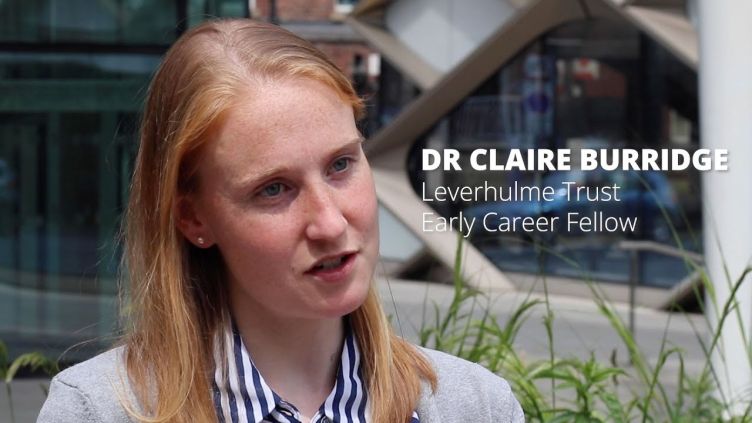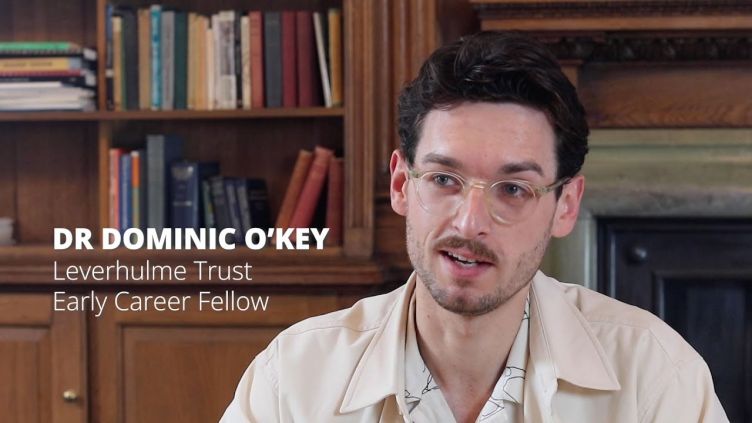Postdoctoral Fellowships in the Arts and Humanities
The Faculty of Arts and Humanities is keen to recruit the highest calibre postdoctoral researchers, supporting candidates via a number of externally funded research fellowship schemes and enabling them to become the research leaders of the future.

Introduction to Postdoctoral Fellowship opportunities
The Faculty of Arts and Humanities supports applications for postdoctoral fellowships in the following departments and schools:
- School of English
- School of History, Philosophy and Digital Humanities
- School of Languages, Arts and Societies
- School of Law
We welcome Fellowship candidates from the UK and overseas. The University of Sheffield provides a highly supportive environment in which to develop your career, hosting Fellows at all stages of their career.
Live Postdoctoral Fellowship Schemes
- Wellcome Trust Early Career Awards
There are deadlines throughout the year for this scheme, usually in February, May and October.
Scheme details
The Wellcome Trust Early Career Award scheme provides funding for early-career researchers who are ready to develop their research identity. Through innovative projects, you will deliver shifts in understanding that could improve human life, health and wellbeing. By the end of the award, you will be ready to lead your own independent research programme.
Eligibility: You can apply to this scheme if you are an early-career researcher and you are ready to design, plan and deliver your own innovative research project. You will have completed a PhD (for example, in the life sciences) or an equivalent higher research degree. You may also have some postdoctoral experience in your proposed field of study, but generally no more than three years. Please visit the scheme website for further eligibility criteria.
Funding available: Your salary and up to £400,000 for research expenses for a period of up to 5 years.
What are research fellowships and why should I apply for one?
- Whilst research grants tend to focus primarily on funding a research project, fellowships tend to focus more on the individual and provide a large amount of dedicated time to focus on individual research.
- An early career fellowship is a great route into a research career. Winning a fellowship is a way to proactively create a job for yourself without relying on the academic job market.
- Fellowships allow you to pursue your own research agenda, gain valuable experience, build your CV to put you in a strong position to apply for permanent posts.
- Fellowships are usually 'responsive mode', which means that the applicant decides the research topic (as long as it is within the funder’s remit). Early career fellowships usually operate on an annual funding cycle, with call deadlines at the same time each year. You apply with the support of the 'host' institution, and will usually work closely with an academic mentor or supervisor, both on your application and throughout the lifetime of your project.
Learn more about working and living in Sheffield, as a city. There are also benefits of working at the University of Sheffield.
Hear from our Postdoctoral Fellows
Fellowship schemes
Please get in touch with the Arts Research Hub at artsresearchhub@sheffield.ac.uk if you would like to apply to a scheme through the University of Sheffield. Ideally, you will aim to do so within 3 months of the funder deadline.
- Leverhulme Early Career Fellowships
Leverhulme Trust Early Career Fellowships (ECFs) aim to provide career development opportunities for those who are at a relatively early stage of their academic careers, but who have a proven record of research. These three-year Fellowships provide an exceptional opportunity to develop as an independent researcher, and will have a significant impact on future career trajectory. The expectation is that Fellows should undertake a significant piece of publishable work during their tenure, and the project put forward should therefore not be a reworking or mere extension of the candidate’s doctoral research project.
Please note that the internal deadlines for the 25/26 competition have now closed. These will reopen in early summer 2026 and more information will be available on this webpage.
For more information about the Leverhulme Early Career Fellowship scheme see: https://www.leverhulme.ac.uk/early-career-fellowships
- MSCA Postdoc fellowships
- Our internal application process for the September 2025 funder deadline is currently closed but this scheme runs on an annual basis. Information to follow for the next round in spring 2026.
The Postdoctoral Fellowships action targets researchers holding a PhD who wish to carry out their research activities abroad, acquire new skills and develop their careers. PFs help researchers gain experience in other countries, disciplines and non-academic sectors.
MSCA Postdoctoral Fellowships are open to all academic disciplines and areas of research, from fundamental research to market take-up and innovation services. The research topic is chosen freely by the applicants (individuals and/or organisations) in a fully 'bottom-up' manner.
Postdoctoral Fellowships can either take place in Europe (i.e. in an EU Member State or a Horizon Europe Associated Country, known as European Postdoctoral Fellowship) or in a Third Country not associated to Horizon Europe (Global Postdoctoral Fellowship). Interested researchers submit an application together with a host organisation, which can be a university, research institution, business, SME or other organisation based in an EU Member State or Horizon Europe Associated Country. All disciplines are eligible for Postdoctoral Fellowships, including research areas covered by the Euratom Research and Training Programme.
The Postdoctoral Fellows can undertake research trips, such as visits to other laboratories, archives or field work, as well as undertaking secondments. There is also an option to undertake an additional placement period of up to six months at the end of the project to spend time in a non-academic organisation established in an EU Member State or Horizon Europe Associated Country.
Types of Postdoctoral Fellowship
As mentioned above, there are 2 types of Postdoctoral Fellowships:
European Postdoctoral Fellowships. These are open to researchers moving within Europe or coming to Europe from another part of the world to pursue their research career. These fellowships take place in an EU Member State or Horizon Europe Associated Country and can last between 1 and 2 years. Researchers of any nationality can apply.
Global Postdoctoral Fellowships. These fund the mobility of researchers outside Europe. The fellowship lasts between 2 to 3 years, of which the first 1 to 2 years will be spent in a non-associated Third Country, followed by a mandatory return phase of 1 year to an organisation based in an EU Member State or Horizon Europe Associated Country. Only nationals or long-term residents of the EU Member States or Horizon Europe Associated Countries can apply.
Secondments
Both types of fellowships may also include short-term secondments anywhere in the world during the fellowship (except during the return phase of a Global Fellowship). In an effort to build bridges between the academic and non-academic sector, researchers can receive additional support to carry out a placement of up to 6 months in a non-academic organisation based in an EU Member State or Horizon Europe Associated Country. This placement needs to take place at the end of their fellowship.
EligibilityTime post PhD: Applicants should have a PhD degree at the time of the deadline for applications. Applicants who have successfully defended their doctoral thesis but who have not yet formally been awarded the doctoral degree will also be considered as postdoctoral researchers and will be eligible to apply. Applicants must have a maximum of 8 years full time equivalent experience in research, measured from the date of award of the doctoral degree. Years of experience outside research and career breaks (e.g. due to parental leave), will not count towards the amount of research experience, nor will years of experience in research in third countries, for nationals or long-term residents of EU Member States or Horizon Europe Associated Countries who wish to reintegrate to Europe.
Mobility rule: Applicants must not have resided or carried out their main activity (work, studies, etc.) in the country of the beneficiary (host institution) (for European Postdoctoral Fellowships), or the host organisation for the outgoing phase (for Global Postdoctoral Fellowships) for more than 12 months in the 36 months immediately before the call deadline (i.e. a researcher wishing to take up one of these awards at the University of Sheffield must not have lived in the UK for more than 12 months in the 3 years prior to the call deadline).
Funding availableThe Fellowship provides funding for the researcher in the form of a living allowance, a mobility allowance, and, where applicable, family, long-term leave and special needs allowances. In addition, funding is provided for research, training and networking costs as well as management and indirect costs.
- BA Postdoc fellowships
Our internal application process for the October 2025 funder deadline is currently closed but this scheme runs on an annual basis. Information to follow for the next round in spring 2026.
The British Academy Postdoctoral Fellowship offers outstanding early career researchers the opportunity to strengthen their experience of research and teaching in an academic environment. This scheme aims to help develop the award holder’s curriculum vitae and boost their prospects of obtaining a permanent academic post. The primary emphasis is on the completion of a significant piece of publishable research, and the integration of the award holder into the community of established scholars within their field.
For more information, please visit the BA Postdoc Fellowship page.
- British Academy International Fellowships
Our internal application process for the 2025 Fellowships is currently closed but this scheme runs on an annual basis. Information to follow for the next round of 2026 Fellowships in late 2025.
The BA International Fellowship scheme enables researchers to work for two years (as opposed to the former three years) at a UK institution with the aim of:
Attracting talented international early career researchers to establish and conduct their research in the UK; Supporting early career researchers to pursue high-quality and innovative lines of research; Providing opportunities to acquire and transfer new skills and knowledge through training and career development; Fostering long-term relationships through networking opportunities and the International Fellowships alumni programme.
Up to £12,000 for research expenses.
Up to £8,000 for relocation expenses.
Note - Consumables may not be used to pay for: publication costs; salary costs or other costs of research staff/assistants; open access fees; and computer hardware including laptops .A maximum total of 1 month of research undertaken outside the UK is permitted over the course of the fellowship.
Duration: 2 years
Eligibility: Applicants must have a PhD or be in the final stages of their PhD, to be completed before the start date of the Fellowship. Applicants should have no more than 7 years of active full-time postdoctoral experience, and should be working outside the UK at the time of application. Finally, they should not hold UK citizenship. Please visit the scheme website for further eligibility criteria.
Funding available: Award-holders will be classified as salaried employees. This will be funded at 80% of the full Economic Cost, meaning a contribution towards overheads costs.
- British Academy Visiting Fellowship
This call is currently closed but runs on an annual basis, and information will follow in early Summer 2025.
The British Academy’s Visiting Fellowships programme provides outstanding academics based in any country overseas with the opportunity to be based at a UK higher education institution. The programme is open to academics at any career stage, and in any discipline within the humanities and social sciences.
Eligibility: Visiting Fellows must be of postdoctoral level or above, or have equivalent research experience at the time of application. Candidates should be based outside of the UK at the time of application. Applicants may be on permanent or fixed-term contracts. Fixed-term contracts must not end before the end date of the Visiting Fellowship. Independent scholars are also welcome to apply.
For more details about the Visiting Fellowship programme, including eligibility requirements, please see the scheme notes.
Scheme details
- enhance and build new links between scholars from around the globe and in the UK;
- foster opportunities and encourage the development of new and future partnerships for collaborative research into the humanities and social sciences;
- enable academics from across the globe to undertake research and/or professional development with UK colleagues;
- strengthen the UK’s research bases in the humanities and the social sciences.
- ESRC New Investigator Grants
This scheme is currently open and operates on an ‘always open’ basis.
ESRC New Investigator Awards are specifically aimed at supporting those looking to make the transition to an independent researcher through managing their first major research project.
Duration: up to 5 years
Eligibility: You cannot apply for funding if you are not an early career researcher, you already hold a professorship, you are a current or former project lead on ESRC or other UKRI grants, except ESRC postdoctoral fellowships. Read more about the eligibility criteria here.
Funding available: fEC, £100,000 to £350,000
- European Research Council Starting Investigator Grant
This call is currently closed however more information will follow for the next round in Spring 2025.
ERC Starting Grants are aimed at allowing potential grantees long-term, significant research funding in order to complete an extensive, ambitious research project. It supports up-and-coming research leaders from all disciplines who have the proven potential of becoming independent research leaders. The sole evaluation criterion is the excellence of the researcher and research proposal.
Duration: up to 5 years
Eligibility: The scheme is for researchers of any nationality with 2-7 years of experience since completion of PhD (or equivalent degree) and a research track record showing great promise. The Principal Investigator (PI) does not necessarily need to be working at the host institution at the time when the proposal is submitted. Please see scheme information for further eligibility criteria.
Funding available: Up to €1.5 million (in some circumstances up to €2 million).


